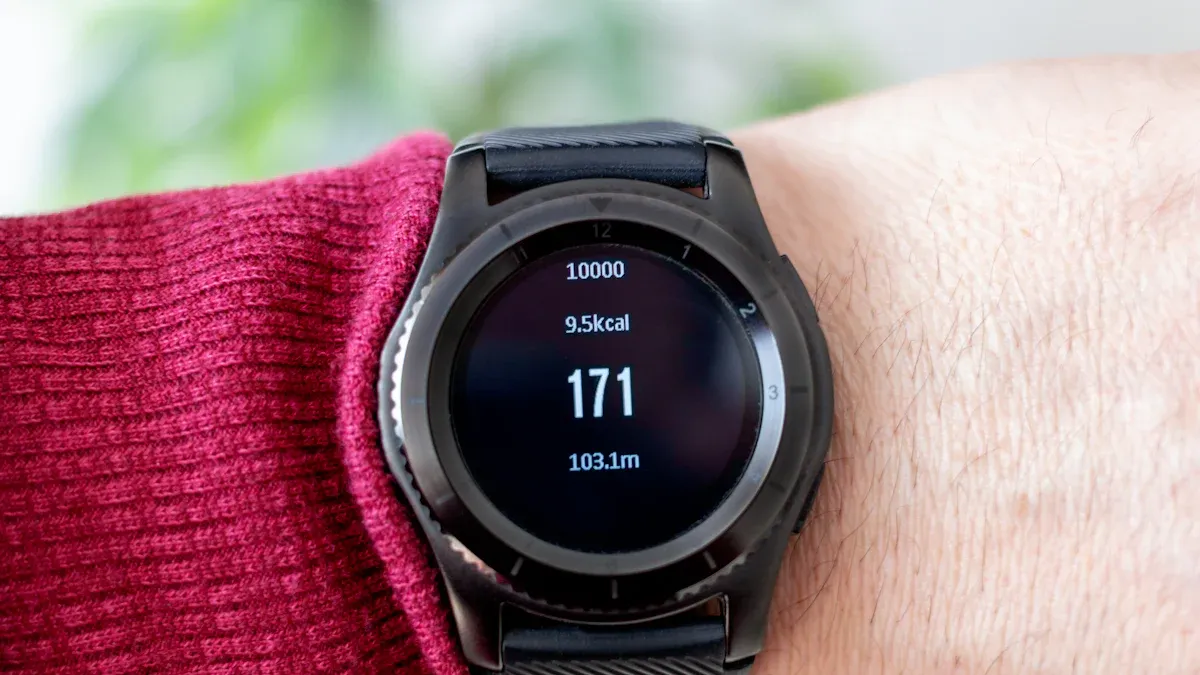
You might ask what a healthy sleeping heart rate is. Most adults have a sleeping heart rate between 40 and 60 beats per minute. The table below shows results from new studies:
Measurement Type | Value (beats per minute) | Notes |
|---|---|---|
Average Sleeping HR | These numbers are from three sessions with 10 women. | |
Mean Minimum HR | 53 ± 7 | This is the lowest heart rate during sleep. |
Minimum HR Range | 36 to 65 | This shows the difference between people. |
Maximum HR Range | 82 to 116 | This also shows the difference between people. |
Watching your sleeping heart rate helps you see changes early. A healthy sleeping heart rate usually means your heart and body are doing well. But everyone’s numbers can be different. Checking your average sleeping heart rate helps you see patterns that matter for your health.
Key Takeaways
Most healthy adults have a sleeping heart rate from 40 to 60 beats per minute. This helps the heart rest and get better.
Age, fitness, sleep habits, and stress can change your sleeping heart rate. Regular exercise and good sleep routines help keep it healthy.
You can track your sleeping heart rate with smart devices. This can show important health patterns and warn you about problems early.
Big changes in your sleeping heart rate or symptoms like dizziness and chest pain need quick medical help.
Keeping a steady sleep schedule, managing stress, and not having caffeine before bed help your heart stay healthy during sleep.
Average Sleeping Heart Rate
Normal Range
You might wonder what counts as a normal sleeping heart rate. Most healthy adults have a normal sleeping heart rate between 40 and 60 beats per minute. Recent clinical guidelines from the American Heart Association and other experts say your heart rate during sleep should be about 10–20% lower than your average resting heart rate during the day. This means if your resting heart rate is 70 beats per minute, your average sleeping heart rate could drop to around 56–63 beats per minute.
Here is a table showing the normal ranges for different groups:
Group | Normal Sleeping Heart Rate (BPM) | Average Resting Heart Rate (BPM) |
|---|---|---|
Healthy adults (general) | 40–60 | 60–100 |
Well-trained adult athletes | 40–50 | 40–60 |
Children over 10 years and adults | 40–60 | 60–100 |
Your heart rate during sleep drops because your body is resting and your heart does not need to work as hard. This lower rate helps your heart recover and stay healthy.
Variations by Age and Fitness
Not everyone has the same average sleeping heart rate. Age and fitness play a big role. Younger adults and athletes often have a lower average heart rate during sleep. If you exercise regularly, your heart becomes stronger and more efficient. This means your heart can pump more blood with each beat, so it does not need to beat as often. Athletes and active people often see their average sleeping heart rate fall to 40–50 beats per minute.
Older adults may have a slightly higher heart rate during sleep. Women tend to have a resting heart rate that is 3–7 beats per minute higher than men. Your bedtime habits also matter. If you go to bed at different times each night, your heart rate during sleep can rise. Not getting enough sleep or drinking caffeine or alcohol before bed can also make your heart beat faster at night.
Regular exercise lowers your average heart rate during sleep.
Irregular sleep schedules and poor sleep hygiene can raise your heart rate during sleep.
Women usually have a higher average sleeping heart rate than men.
Children have a faster heart rate during sleep than adults.
Why It Matters
Tracking your average sleeping heart rate gives you important clues about your health. A healthy sleeping heart rate means your heart and nervous system are working well. If your heart rate during sleep stays too high or too low, it could signal a problem. For example, a high heart rate during sleep can point to stress, sleep disorders, or heart disease. Sleep apnea can cause your heart to work harder at night, raising your average sleeping heart rate.
A normal sleeping heart rate helps your heart rest and recover. When your heart rate drops at night, your body repairs itself and prepares for the next day. If your heart rate does not dip enough, studies show you may have a higher risk of heart problems later. Doctors use changes in your average heart rate during sleep to spot early signs of trouble.
Tip: If you notice big changes in your average sleeping heart rate, or if you feel dizzy, short of breath, or have chest pain, talk to your doctor. Keeping a regular sleep schedule and managing stress can help you keep a healthy sleeping heart rate.
Sleep Heart Rate Factors
Age and Activity
Your age and daily activity level play a big role in your heart’s rhythm during sleep. As you get older, your heart rate variability (HRV) often decreases. This means your heart does not change its speed as easily as it did when you were younger. Older adults usually have a slightly higher resting heart rate and a shorter time between heartbeats during deep sleep.
Physical activity helps your heart stay strong. If you move more during the day, your resting heart rate and sleep heart rate often stay lower. People who walk, run, or play sports regularly see their heart rate drop at night. Even simple activities like gardening or taking the stairs can help. Studies show that more daily movement and longer sleep both lead to a healthier heart rate profile, no matter your age. When you sleep well and stay active, your normal sleeping heart rate stays in a healthy range.
Tip: Try to get some form of movement every day. Even light activity can help your heart rest better at night.
Health and Lifestyle
Many factors in your daily life affect your heart rate while you sleep. Your body’s nervous system controls how fast your heart beats. The balance between the sympathetic (fight or flight) and parasympathetic (rest and digest) systems changes during sleep. During deep sleep, your body relaxes, and your heart rate drops. In REM sleep, your heart rate can rise and fall quickly.
Other things that affect your normal sleeping heart rate include:
Stress levels: High stress can keep your heart rate higher at night.
Sleep quality: Poor sleep or waking up often can raise your heart rate.
Body movements: Tossing and turning can cause your heart rate to spike.
Circadian rhythms: Your body’s natural clock affects your heart’s pattern.
Health conditions: Illness, medications, or chronic diseases can change your resting heart rate and sleep patterns.
If you notice changes in your sleep heart rate, look at your daily habits. Small changes, like relaxing before bed or keeping a steady sleep schedule, can make a big difference.
Sleep Stages and Heart Rate
Light and Deep Sleep
Your body moves through different stages of sleep each night. In light sleep, your heart rate during sleep starts to slow down. Dr. Lawrence Epstein explains that your heart rate drops to resting levels within minutes after you fall asleep. Your muscles relax, and your body temperature goes down. This stage helps your body begin to rest.
As you enter deep sleep, your heart rate during sleep drops even more. Your blood pressure also falls. During this stage, your heart rate can reach 20-30% below your normal resting level. Deep sleep is when your body repairs itself. Your heart and blood vessels get a break. This stage is important for feeling refreshed in the morning. If you do not get enough deep sleep, your body may not recover well from daily stress.
Note: Deep sleep helps your heart recover and keeps your body healthy. Try to get enough sleep each night to support your heart.
REM Sleep
REM sleep is different from light and deep sleep. Your brain becomes very active, and you may dream. During REM sleep, your heart rate becomes less steady. It can rise and fall quickly, sometimes acting like you are awake. Scientists have found that your heart rate variability changes a lot in this stage.
The balance between your body’s calming and alert systems shifts.
The low-frequency to high-frequency ratio of heart rate variability goes up, showing more activity from your body’s alert system.
The calming system steps back, and the alert system takes over for a short time.
Even though your heart rate during sleep does not always go up, the way it changes tells doctors about your health.
These changes in REM sleep help your body and brain process emotions and memories.
REM sleep keeps your heart and brain active in special ways. Watching these changes can help you understand your sleep quality and overall health.
Monitoring Sleep Heart Rate

Wearables and Devices
You can use smart rings and watches to check your sleeping heart rate. Devices like the VERTU Aura Ring, Oura Ring, and Fitbit Sense 2 have special sensors. These sensors measure your heart rate and watch your sleep stages. Most of these gadgets use photoplethysmography (PPG) and accelerometers. PPG shines a light on your skin to see your blood flow. Accelerometers sense how much you move while you sleep. These tools help the device know when you are sleeping and how your heart acts at night.
Here is a table that compares some popular devices:
Feature | VERTU Aura Ring | Oura Ring 3 / Fitbit Sense 2 |
|---|---|---|
Design | Luxury, lightweight, comfortable | Sleek, functional |
AI Health Insights | Advanced AI-powered analytics | Basic to moderate analytics |
Accuracy | ~85% vs. gold standard (PSG) | ~90% (Oura Ring 3) |
Battery Life | Up to 10 days | 4-7 days |
App Experience | Intuitive, clear, actionable insights | User-friendly, some require subscription |
Subscription | No subscription needed | Some require subscription |
The VERTU Aura Ring is known for its fancy look and long battery life. It also gives you smart health tips using AI. The ring feels nice to wear and you do not need to pay extra for all the features.
Note: These devices are not as exact as a sleep lab test. But they can still show you useful patterns and changes in your sleep.
Home Tracking Tips
You can get better results from your sleep tracker by doing a few easy things:
Put your ring on your index or middle finger for best results.
Make sure the ring fits well but is not too tight.
Use the same finger every night to keep your data steady.
Charge your device so it has more than 40% battery before bed.
Sync your data each morning so you do not lose it.
Do not drink caffeine or alcohol before bed because it can change your heart rate.
Update your device’s app and firmware to get new features.
Check your heart rate trends over a week or two, not just one night.
Write down your activity, stress, and health to compare with your sleep data.
If your data looks strange, check the fit, clean the sensors, or restart the device.
Tip: If you notice big changes in your sleep heart rate or feel sick, talk to your doctor. Your device can help you see trends, but a doctor can give you the best advice.
When to Seek Help
High or Low Heart Rate
You might wonder when your sleeping heart rate is a problem. Most adults have a sleeping heart rate from 40 to 60 beats per minute. Sometimes, your heart rate can be higher or lower than this. There are many reasons why this can happen. Some reasons are not serious, but others need a doctor’s help.
Common causes for an abnormal sleeping heart rate are:
Heart conditions like arrhythmias or heart block
Thyroid problems, such as hyperthyroidism or hypothyroidism
Anemia or low red blood cell count
Sleep disorders, including sleep apnea
Dehydration or fever
High caffeine or alcohol intake
Stress or not getting enough sleep
Certain medications, like beta-blockers or stimulants
Blood sugar changes, such as diabetes or hypoglycemia
You should see your doctor if you notice:
Your average sleeping heart rate is always above 100 beats per minute
Your sleeping heart rate is below 60 beats per minute and you are not an athlete
You feel dizzy, short of breath, or have chest pain with heart palpitations
You see big changes in your heart rate after starting new medicine
You have symptoms like fainting or feeling very tired
A sleeping heart rate that is not normal could mean you have a problem like sleep apnea or arrhythmia. Your doctor can help you figure out what is wrong.
Warning Signs
Sometimes, your body gives you signs that you need help. Watch for these warning signs when you check your sleep:
Warning Sign | What It Means |
|---|---|
Light-headedness or dizziness | May point to heart problems |
Chest pain or discomfort | Could signal a heart attack or arrhythmia |
Trouble breathing | May show heart or lung issues |
Fainting or loss of consciousness | Needs urgent medical attention |
Resting heart rate >120 or <45 bpm | Heart rate is too high or too low |
Long or frequent palpitations | May mean an irregular heartbeat |
Swelling in legs or feet | Can be a sign of heart failure |
Extreme tiredness or confusion | May show heart is not working well |
If you notice any of these symptoms, get medical help right away. Your heart health is important, and getting help early can really help.
Knowing your average sleeping heart rate helps you spot early signs of heart problems and supports long-term health. Devices like the Aura Ring make tracking easy and accurate, so you can see trends and share them with your doctor. To keep your heart healthy while you sleep:
Practice stress reduction, like meditation or deep breathing.
Avoid caffeine and heavy meals before bed.
Stay active during the day.
If you notice big changes or feel unwell, talk to your healthcare provider. Regular monitoring and healthy habits protect your heart for years to come.
FAQ
What is the best way to measure my sleeping heart rate at home?
You can use a smart ring, like the VERTU Aura Ring, or a fitness tracker. Wear the device while you sleep. Check your app in the morning for your heart rate data.
Can stress affect my sleeping heart rate?
Yes, stress can raise your heart rate during sleep. Your body stays alert, even at night. Try deep breathing or meditation before bed to help lower your heart rate.
How often should I check my sleeping heart rate?
Check your sleeping heart rate every night for the best results. Look for trends over a week or more. This helps you spot changes in your health early.
Is a low sleeping heart rate always a sign of good health?
Not always. Athletes often have low heart rates, which is normal for them. If you feel dizzy, tired, or weak, talk to your doctor. Low heart rates can sometimes signal a health problem.
What should I do if my device shows a sudden change in my sleeping heart rate?
If you see a big change, stay calm. Check your device for errors. If the change continues or you feel unwell, contact your healthcare provider for advice.








